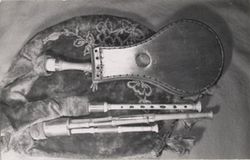Template:Featured Tune: Difference between revisions
No edit summary |
No edit summary |
||
| Line 3: | Line 3: | ||
<p><font face="Century Gothic" size="2"> | <p><font face="Century Gothic" size="2"> | ||
<div style="text-align: justify; direction: ltr; margin-left: 0pX; margin-right: 0px;"> | <div style="text-align: justify; direction: ltr; margin-left: 0pX; margin-right: 0px;"> | ||
[[File: | [[File:NorthumbrianSmallPipe.jpg|250px|link=|left|The Northumbrian Small Pipes]] | ||
One of the core tunes of Northumbrian piping repertoire. J. Collingwood Bruce & John Stokoe (1882) remarK: "This tune has at some remote period been used for a song, of which now only a fragment in known— | |||
<blockquote> | |||
''I saw my love come passing by me,''<br> | |||
''But shame to the hade, she ne'er cam' nigh me.''<br> | |||
</blockquote> | |||
In some very old copies it is marked as the 'Duchess of Northumberland's Delight'--an allusion, probably, to Elizabeth, the first Duchess, who (with her husband) by her patronage and support greatly encouraged the use of the pipes in the country." | |||
<br> | <br> | ||
Matt Seattle finds an ancestral tune in an older Scottish melody called "[[Put on thy Smock on a Monday]]/Put on Your Sark on Monday" (there are various spellings), which can be found in lute manuscripts. He says, "A clear continuity of musical development can be traced through the most significant local versions in the William Dixon manuscript (1733), '''Peacock's Tunes''' (c. 1805) and here in the Clough collection (early 20th century)" [http://www.asaplive.com/archive/detail.asp?id=C0100001]. Scottish versions can also be found as "[[Drunken Wives of Carlisle (The)]]" (Robert Riddell) and "[[Gi'e the Mawking mair o't]]." | |||
<br> | <br> | ||
</div> | </div> | ||
</font></p> | </font></p> | ||
---- | ---- | ||
[[Annotation: | [[Annotation:I_Saw_My_Love_Come_Passing_By_Me|I SAW MY LOVE COME PASSING BY ME full Score(s) and Annotations]] and [[Featured_Tunes_History|Past Featured Tunes]] | ||
---- | ---- | ||
<div class="noprint"> | <div class="noprint"> | ||
{{#widget:SoundCloud |id= | {{#widget:SoundCloud |id= 36626386}} | ||
<!-- {{#ev:youtube|yUQ5vaZSH40|dimensions=200x100}} --> | <!-- {{#ev:youtube|yUQ5vaZSH40|dimensions=200x100}} --> | ||
</div> | </div> | ||
| Line 26: | Line 30: | ||
%% composerfont "Century Gothic" 14 | %% composerfont "Century Gothic" 14 | ||
%% infofont "Century Gothic" 14 | %% infofont "Century Gothic" 14 | ||
T: | T:I saw my Love come passing by me | ||
M:C| | |||
M:C | |||
L:1/8 | L:1/8 | ||
R: | R:Air | ||
K: | S:John Rook music manuscript collection (Waverton, Cumbria, 1840, p. 166) | ||
c|c | Z:AK/Fiddler’s Companion | ||
c | K:G | ||
A | d/e/f|gG B/c/d/B/ g2 de/f/|gG B/c/d/B/ f2 Ae/f/|gG B/c/d/B/ BG B/c/d/e/B/| | ||
c/d/e/c/ B/c/d/B/ A/B/c/A/ e/f/g/e/::gdgB gd e/f/g/e/|gdgB aA e/f/g/e/| | |||
gdgB gG B/c/d/B/|c/d/e/c/ B/c/d/B/ A/B/c/A/ e/f/g/e/::G/A/B/c/ B/c/d/B/ G/A/B/G/ B/c/d/B/| | |||
G/A/B/G/ B/c/d/B/ A/B/c/A/ e/f/g/e/|G/A/B/G/ B/c/d/B/ g/f/e/d/ B/c/d/B/| | |||
c/d/e/c/ B/c/d/B/ A/B/c/A/ e/f/g/e/::d/e/f/d/ e/f/g/e/ g/f/e/d/ e/f/g/e/| | |||
d/e/f/d/ e/f/g/e/ A/B/c/A/ e/f/g/e/|d/e/f/d/ e/f/g/e/ g/b/e/d/ B/c/d/B/| | |||
c/d/e/c/ B/c/d/B/ A/B/c/A/ e/f/g/e/::gfed Tg2 de/f/|gfed Tf2 Ae/f/| | |||
gfed BG B/c/d/B/|c/d/e/c/ B/c/d/B/ A/B/c/A/ e/f/g/e/:| | |||
Gg B/c/d/B/ dg B/c/d/B/|Gg B/c/d/B/ Ag e/f/g/e/|Gg B/c/d/B/ c/d/e/c/ B/c/d/B/| | |||
c/d/e/c/ B/c/d/B/ A/B/c/A/ e/f/g/e/::TGe/d TBe/d/ TBe/d/ TBe/d/| | |||
Ge/d/ Be/d/ Ae/d/ Ae/d/|Ge/d/ Be/d/ Be/d/ Be/d/|ce/d/ Be/d/ Ae/d/ g/f/e/d/:|] | |||
Revision as of 16:45, 2 February 2019

One of the core tunes of Northumbrian piping repertoire. J. Collingwood Bruce & John Stokoe (1882) remarK: "This tune has at some remote period been used for a song, of which now only a fragment in known—
I saw my love come passing by me,
But shame to the hade, she ne'er cam' nigh me.
In some very old copies it is marked as the 'Duchess of Northumberland's Delight'--an allusion, probably, to Elizabeth, the first Duchess, who (with her husband) by her patronage and support greatly encouraged the use of the pipes in the country."
Matt Seattle finds an ancestral tune in an older Scottish melody called "Put on thy Smock on a Monday/Put on Your Sark on Monday" (there are various spellings), which can be found in lute manuscripts. He says, "A clear continuity of musical development can be traced through the most significant local versions in the William Dixon manuscript (1733), Peacock's Tunes (c. 1805) and here in the Clough collection (early 20th century)" [1]. Scottish versions can also be found as "Drunken Wives of Carlisle (The)" (Robert Riddell) and "Gi'e the Mawking mair o't."
I SAW MY LOVE COME PASSING BY ME full Score(s) and Annotations and Past Featured Tunes
X:1 %%font "Century Gothic" %%titlefont "Century Gothic" 24 %%subtitlefont "Century Gothic" 16 %%textfont "Century Gothic" 16 %% composerfont "Century Gothic" 14 %% infofont "Century Gothic" 14 T:I saw my Love come passing by me M:C| L:1/8 R:Air S:John Rook music manuscript collection (Waverton, Cumbria, 1840, p. 166) Z:AK/Fiddler’s Companion K:G d/e/f|gG B/c/d/B/ g2 de/f/|gG B/c/d/B/ f2 Ae/f/|gG B/c/d/B/ BG B/c/d/e/B/| c/d/e/c/ B/c/d/B/ A/B/c/A/ e/f/g/e/::gdgB gd e/f/g/e/|gdgB aA e/f/g/e/| gdgB gG B/c/d/B/|c/d/e/c/ B/c/d/B/ A/B/c/A/ e/f/g/e/::G/A/B/c/ B/c/d/B/ G/A/B/G/ B/c/d/B/| G/A/B/G/ B/c/d/B/ A/B/c/A/ e/f/g/e/|G/A/B/G/ B/c/d/B/ g/f/e/d/ B/c/d/B/| c/d/e/c/ B/c/d/B/ A/B/c/A/ e/f/g/e/::d/e/f/d/ e/f/g/e/ g/f/e/d/ e/f/g/e/| d/e/f/d/ e/f/g/e/ A/B/c/A/ e/f/g/e/|d/e/f/d/ e/f/g/e/ g/b/e/d/ B/c/d/B/| c/d/e/c/ B/c/d/B/ A/B/c/A/ e/f/g/e/::gfed Tg2 de/f/|gfed Tf2 Ae/f/| gfed BG B/c/d/B/|c/d/e/c/ B/c/d/B/ A/B/c/A/ e/f/g/e/:| Gg B/c/d/B/ dg B/c/d/B/|Gg B/c/d/B/ Ag e/f/g/e/|Gg B/c/d/B/ c/d/e/c/ B/c/d/B/| c/d/e/c/ B/c/d/B/ A/B/c/A/ e/f/g/e/::TGe/d TBe/d/ TBe/d/ TBe/d/| Ge/d/ Be/d/ Ae/d/ Ae/d/|Ge/d/ Be/d/ Be/d/ Be/d/|ce/d/ Be/d/ Ae/d/ g/f/e/d/:|]
